




 |
   |
 |
 |
Rise Again (197?, 31.13) *½/TTT |
|
| Give Them All How Great Thou Art Born Again Rise Again Mary Had a Little Lamb Brand New Life Home Where I Belong Jesus Died for Me |
Let Your Light Shine You're Something Special |
|
Current availability:
Mellotron used:
Janie White & Son-Light's undated Rise Again is a typical mid-'70s Christian MOR effort ('thanks', once again, to Mark Medley for this), its contents covering the entire emotional spectrum from A to B. The unbelievably mawkish Mary Had A Little Lamb probably wins the album's uncoveted 'biggest steaming turd' award, against exceedingly stiff competition, notably closer You're Something Special's 'cute' (i.e. tuneless and vomit-inducing) kids' chorus, the Whites' son's solo spot actually making me physically wince. Are there any upsides to this stinking piece of crap? White's contralto voice has more than a little of the Karen Carpenters about it, for better or worse; in fairness (and unlike many of her Christian contemporaries), she can actually sing, shame she chose to waste her talents on something this crass.
Tom Smith plays 'string Melatron' on several tracks, in full-blown 'real strings replacement' mode, notably the high-speed part on opener Give Them All and the upfront ones on the smooth Christian jazz (I shit you not) of Home Where I Belong, the more sedate parts on the other highlighted tracks being the best thing about this sorry effort, knocking Ms White's genuinely excellent voice into second place. Be very thankful you're unlikely to run into a copy of this horror any time soon.
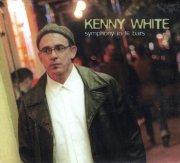 |
Symphony in 16 Bars (2005, 46.42) ***½/T |
|
| Until You Learn Shoot the Moon Anabel Might as Well Leave Different Today 5 Girls Letter From X-Ray |
Heart of the City Workin' on a Way Closer Symphony in 16 Bars |
|
Current availability:
Chamberlin used:
Kenny White worked as a commercial jingle writer before trying his hand at the piano-driven singer-songwriter game, the end result, on his second outing, 2005's wittily-titled Symphony in 16 Bars, being a melody-rich, vaguely jazzy record that wouldn't have sounded out of place in 1975. That's a compliment, incidentally. Top tracks? I agree with whichever online reviewer lauded the wordy (in a good way) 5 Girls and the closing title track.
Paul Bryan is credited with Chamberlin on two tracks, with nothing obvious on Letter From X-Ray and an arranged strings part on Closer, although a chordal flute part also turns up on Might As Well Leave. Is Letter From X-Ray a mis-credit? It wouldn't be the first time...
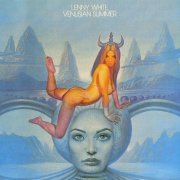 |
Venusian Summer (1975, 38.56) ***½/½Chicken-Fried SteakAway Go Troubles Down the Drain The Venusian Summer Suite Pt. 1: Sirènes Pt. 2: Venusian Summer Prelude to Rainbow Delta Mating Drive Prince of the Sea |
Current availability:
Mellotron used:
Lenny White shot to prominence at the tender age of twenty, in 1969, after drumming on Miles Davis' seminal Bitches Brew, going on to play with Return to Forever throughout the '70s. It's therefore hardly surprising that his first solo album, 1975's Venusian Summer, is a through-and-through fusion record, although it has its quieter moments, not least the ominous first part of The Venusian Summer Suite, Sirènes. The playing on the rest of the album is probably most accurately described as 'fiery', notably on Mating Drive, featuring some of the most ridiculously athletic bass playing this side of a, well, fusion bassists convention, I suppose, from the outstanding Doug Rauch.
Loads of White's mates play on the album, including no fewer than four different MiniMoog players, plus Onaje Allan Gumbs on Mellotron, amongst other things. Mind you, if you can spot where it might be, you're doing better than me; it might just be providing either strings or flutes in the deep background on Mating Drive, but not so's you'd really notice. Overall then, a superior fusion album, avoiding some of the genre's clichés whilst accentuating others, but in a good way. Maybe you have to be American to play this kind of stuff this well? Don't know, but fusion fans need this album a great deal more than Mellotron ones.
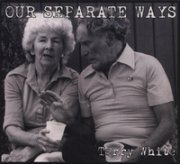 |
Our Separate Ways (2006, 42.34) ***½/½ |
|
| My Own Head Live in a Box Night Keeps Falling St. Patrick And So Are You (Mama's Gone) Come and See The Ballad of Polly and Neil |
Why'd You Give Up on Me Choo-Choo Train My Doctor Told Me Blues |
|
Current availability:
Mellotron used:
According to his CD Baby blurb, Terry White recorded Our Separate Ways over a period of time, using two different bands, due to availability, despite which, the end result sounds remarkably cohesive. The bulk of it's not so much country as American folk, although it strays into country territory here and there, highlights including Live In A Box, both musically and lyrically, Night Keeps Falling, St. Patrick and amusing closer My Doctor Told Me Blues.
Pat Brennan plays a tragically brief Mellotron string part on Night Keeps Falling, sounding nicely real, for a change, despite this being such a budget release. So; nothing outstanding, nothing that original, but a really nice set of actual songs, played and sung with a bit of genuine feeling. And a few seconds of Mellotron.
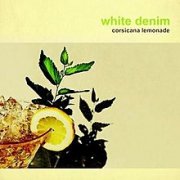 |
Corsicana Lemonade (2013, 37.50) ***/T |
|
| At Night in Dreams Corsicana Lemonade Limited By Stature New Blue Feeling Come Back Distant Relative Salute Let it Feel Good (My Eagles) Pretty Green |
Cheer Up/Blues Ending A Place to Start |
|
Current availability:
Mellotron used:
Texan experimentalists (kind of) White Denim's sixth album in as many years, Corsicana Lemonade, is, I'm led to believe, their most accessible release yet, their math-rock leavened by '70s mainstream rock, typified by the almost-southern rock of New Blue Feeling and Come Back.
Matt Oliver and Wilco's Jeff Tweedy play (Wilco's MkVII?) Mellotron flutes, the former with a polyphonic part on New Blue Feeling and the latter with barely-audible ones on Let It Feel Good (My Eagles). I'm not going to tell you this is the most exciting thing I've heard all year (or possibly even all day), but it's perfectly acceptable, although too restrained for its own good on the Mellotron front.
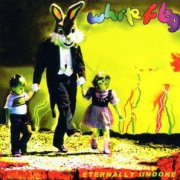 |
Eternally Undone (1999, 46.52) ***½/½ |
||
| On the Way Down Don't Bring Me This Time in Reverse Marshwiggle Empty Heaven Daddy's Girl A Moment of Silence Constellations |
Launch Window Counterclockwise Faith Void You Can't Stay Here Danger Island (Nano's Song) Novacaine Strongarm Scratch R.U. Reciving Me? |
||
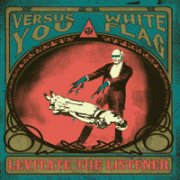 |
Levitate the Listener [split w/Versus You] (2011, 20.34) ***/½White Flag contribute:Forever Changes What Can I Do in a Day? Dido Architects Magically Delicious A Cellar Full of Neu!'s Please Stand By The Witch |
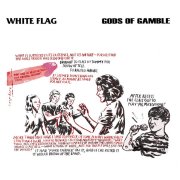 |
Extraordinary Renditions [split w/Gods of Gamble] (2011, 19.18) ***/½White Flag contribute:2B...Or Not to Be (the Swindle) Instant Breakfast Ilyaa Lloig Shattered Badge Let's Live for Today Within You, Without You, Too Fhtagn Lw'nafh Ilyaa N'ghft (Extra Sensory Deception) |
Current availability:
Mellotrons used:
White Flag formed in the early '80s as a reaction against the era's none-more-serious hardcore scene, right down to their Black Flag-satirising name and nom de plumes (noms de plume?), including Mike Mess (sending up Social Distortion's Mike Ness), Jello B. Afro (Dead Kennedys' Jello Biafra) and Pat Fear (The Germs/Nirvana's Pat Smear). Despite the satire, they were apparently friends of many hardcore scenesters, confusing dimwitted fans.
1999's Eternally Undone (often listed as appearing in 2001) appears to've been their first release in a decade, more powerpop than punk, hardly surprising when you note that songwriters include Jellyfish's Roger Manning and The Posies' Ken Stringfellow. Highlights? It's all good, but opener On The Way Down, Empty Heaven, A Moment Of Silence and the punky Counterclockwise (replaced on some versions by Ask Anybody) stand out. Bonus tracks (left off the above tracklisting due to their irrelevance to this site) include a handful of covers, not least the mighty Blue Öyster Cult's Hot Rails To Hell and Kiss' Deuce, strangely retitled Sweet Bobby Brady. Mellotron? Bill "Pat Fear"' Bartell wrote to me in 2011, two years before his untimely death, to tell me about these releases. He didn't give track details for this album, but Brian Kehew's M400 can be heard, badly recorded, with a thin string part and cheekily pitchbent choirs on Danger Island (Nano's Song).
2011's Levitate the Listener is one of many split LPs the band have released over the years, this one with punksters Versus You, whose contributions are decent enough, in a punk-end-of-pop-punk kind of way. White Flag's side of the album isn't dissimilar to their work on Eternally Undone, despite being over a decade later, highlights including the amusingly-titled Dido, which cheekily namechecks the now-largely forgotten singer of the same name, in the tradition of The Rumour's Max and Nick Lowe's Bowi (look 'em up) and Magically Delicious. Their raucous cover of The Rattles' iconic The Witch is pretty decent, too, also the only Mellotron track, with an ascending, not-that-Mellotronic string line towards the end of the track.
Another split the same year, Extraordinary Renditions, this time with Gods of Gamble (whose contributions are listenable, but less so than Versus You's), probably has fewer highlights than its immediate predecessor, although the punky Instant Breakfast and the Ramones/Kiss cross (!) Ilyaa Lloig are pretty decent. If Fear hadn't told me there was Mellotron on Fhtagn Lw'nafh Ilyaa N'ghft (Extra Sensory Deception), I'd have had no idea; once you know, you can hear the skronky strings in the background, but really only just.
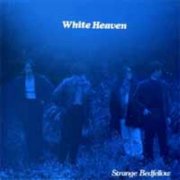 |
Strange Bedfellow (1993, 37.23) ***/TSnowH.L. Silver Current Paper Beach Behind the Locked Door The Way We Were Coloured Mind Drops Mandy Blue |
Current availability:
Mellotron used:
White Heaven were Japanese Quicksilver/Doors referencers, going by their second album (of four), 1993's Strange Bedfellow. The band coalesced out of '80s psychsters Living End, releasing their first album in '91 and refining their sound for the follow-up, which sounds almost exactly like a lost artefact from 1969, tracks like the rocking H.L. and the gentle Behind The Locked Door typifying their acid-drenched approach.
New guitarist Soichiro Nakamura plays a decent chordal Mellotron flute part on closer Mandy Blue, which almost sounds like it's from a different album. I've seen this described as a 'psych classic'; I'm not sure I'd go that far, but it's definitely worth the effort for fans of jammed-out guitar psych. You'll never find a vinyl original and it's apparently 'unlikely' ever to appear on CD (why?), but it's available from download blogs.
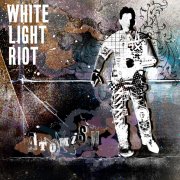 |
Atomism (2007, 46.01) **/T |
|
| Charlatan Atomism Out of Sight Dive Transit State Grey Divide In a Shotgun Whirlwind Midway Souvenirs |
Tourniquet Choice Theory Our Formative Capital Forever in the West |
|
Current availability:
Mellotron used:
White Light Riot play US indie in almost exactly the same way as every other US indie outfit, so while nowhere near as irritating/downright offensive as that terrible 'MOR rock' thing they've got going on over there, nor are they actually at all, you know, exciting. 2007's Atomism is their second album and their sole release (to date) on an actual label, as against self-released. What's it like? It's like US indie, almost entirely devoid of character, without even the benefit of any decent tunes to liven things up a little. I'm succinct, me.
Now ex-guitarist Joe Christenson plays (real?) Mellotron, with a string part towards the end of Transit State and the same on Tourniquet, plus background flutes on Choice Theory, although any other possible parts appear to be something else. This is very dull indeed, so with little Mellotronic input, real or otherwise, I feel honour bound to advise you to go elsewhere.
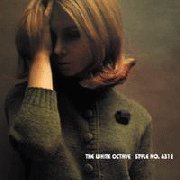 |
Style No. 6312 (2000, 39.26) **/T |
|
| Appeals for Insertion Crashing the Clarion Devise Executes Etc. Call the Kiss Piss and Vinegar Adult Entertainment Crossing the Rubicon |
No Resolution Theory This is Not a Subsistence Existence South Guts and Black Stuff Style No. 6312 |
|
Current availability:
Chamberlin used:
I couldn't honestly tell you into which sub-sub-subdivision of The Beast Called Rock White Octave fit. Emo? Indie? Post-grunge (whatever that might be)? Going by their first (of two) albums, 2000's Style No. 6312, they seem to be quite upset about something; while I've no idea what, they go on about it for nearly forty minutes of shouty nonsense, so it must be getting to them fairly badly. Any less tiresome tracks? The instrumental Piss And Vinegar and the closing title track, perhaps.
Drummer Robert P. Biggers Jr. plays Fidelitorium Studios' Chamberlin, with a string arrangement in another instrumental, Guts And Black Stuff, although the strings rolling over into the title track must be the credited Solina.
White Willow (Norway) see: |
 |
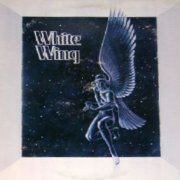 |
White Wing (1976, 37.58) ***½/TTT |
|
| Hansa (Cygnus) Patent Leather Slave Wait Till Tomorrow The White Ship Harbinger A Little Levity Tuzashottma |
Executive Privilege Hansa (Aquila) |
|
Current availability:
Mellotron used:
White Wing were precursors to the (marginally) better-known Asia (vastly superior US version) and sound a great deal more 'mid-'70s', for the pretty fair reason that that's when they existed. Rather than Asia's full-on frontal assault, White Wing contains a rather sort of middling hard rock, even the heaviest tracks (Patent Leather, A Little Levity) being slightly on the tame side in comparison, which isn't to say they're bad, just a little generic. Actually, some of the album's best tracks are the quieter ones, not least opener Hansa (Cygnus) and its closing reprise, Hansa (Aquila), lush ballads stuffed full of Mellotron strings, making the former a slightly odd first track, though effective nonetheless.
Speaking of which, strings on three more tracks (Slave, Wait Till Tomorrow and The White Ship), played by guitarist Mike Coates, who reprised his dual role a few years later in Asia. All five of the album's relevant pieces feature the (studio?) machine fairly prominently, although it never gets quite as in-yer-face as on the first and last tracks. Now this is readily available, do you bother? Well, don't expect anything much like Asia and you won't be too disappointed, although its Mellotronic input is pretty reasonable. Good, but not outstanding.
See: Asia
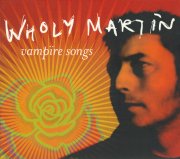 |
Vampïre Songs (2004, 47.46) ***½/T |
|
| The Vampïre Song 1/2 Ride Mule Ride Senseless Ride Wholy Intervention Man on the Bridge Quiet Corners |
The Vampireturns This Night The Magician Both Hands Free W-O-O-D-S Woodland |
|
Current availability:
Mellotron used:
Helge Martin Framnes' first full-lengther as Wholy Martin, 2004's Vampïre Songs, is, loosely, an alt.rock singer-songwriter effort, for want of a better description, possibly at its best on dark opening kind-of title track The Vampïre Song, the energetic Ride Mule Ride and lengthy, slowcore closer Woodland. It doesn't all work - W-O-O-D-S is a clattery mess to my ears - but the overall impression is of an artist who knows exactly what he wants and isn't interested in the dictates of fashion.
Three credited Mellotron players, Bengt O. Hansen, producer The Smell of Incense's Bjørn Fløystad and our old friend Kåre Christoffer Vestrheim, with a flute line and choir chords on The Vampïre Song and background strings on Man On The Bridge, identification complicated by the presence of an actual string section on several tracks. Is there any more hidden away in the mix? Possibly, while I'm not convinced either the strings or choir aren't sampled, but those flutes sound real enough.
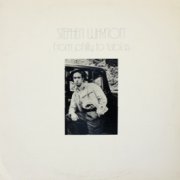 |
From Philly to Tablas (1977, 35.19) ***/TTTT |
|
| Retreat Suite What Have You Seen Altitude Rain Swollen Highway Nine Day Sunflower Without Us Go Around Snows Edge |
Mexican Oil Oh Boy, I've Won The Contest At Last |
|
Current availability:
Mellotron used:
As far as anyone knows, Stephen Whynott released just two LPs in the late '70s, 1977's From Philly to Tablas and the following year's Geography. He operated in the rather overwrought end of the folk-rock spectrum, sounding rather out of time in '77, although the US market seemed to support various supposedly 'outdated' styles past their alleged sell-by dates, probably due to the country's size. From Philly to Tablas was the only one to feature the Mellotron and despite Whynott's emoting, it has its moments, not least its two longest tracks, Go Around and Snows Edge [sic], the former featuring a great solo Hammond part and the latter some classy echoed Rhodes work, both from Dan Frye.
Frye also played Mellotron on several tracks, with flutes, cellos and strings in opener Retreat Suite, piercingly high strings on Rain Swollen Highway, cellos and strings on Without Us, flutes on Go Around... Seems like this is another unsuspected Mellotron-heavy album (plus real oboe) and is worth picking up for its Mellotronness, should you feel so inclined. I hear that although this has never been issued on CD, it sold surprisingly well at the time, all things considered and isn't impossible to find for a few bucks. You may not warm to Whynott's dated material, but the Mellotron use here is excellent, so pick it up if you see it at a decent price.
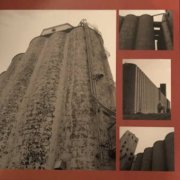 |
Oak Creek Recordings (2018, 37.44) ***/T½CumulusThe Joe Daley Trio Sketch For 24 Bass Clarinets Improvisation For Two Waterphone Players, Vibraphonist And Bass Clarinet Silent Rael's Empty Boat Egisto Macchi Washington Island |
Current availability:
Mellotron used:
Jason Wietlispach is a classical DJ and musician, whose 2018 instrumental release on his own Soutrane label, Oak Creek Recordings, appears to be his second album. It's a largely experimental, ambient work, featuring his bass clarinet heavily, alongside vibraphone, singing bowls, bass (electric and acoustic) and various synths, amongst other instrumentation. Best track? I'm not sure if that's a relevant approach to use for this unusual album, but possibly thirteen-minute opener Cumulus, if only because it typifies Wietlispach's approach from the off.
Wietlispach plays his own M400 on two tracks, with drifting choirs on Silent Rael's Empty Boat (see what he did there?) and closer Washington Island. This won't be for everyone, but the more experimentally-minded out there should give this a go.
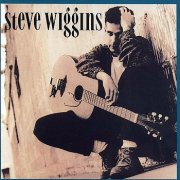 |
Steve Wiggins (1991, 35.30) **½/T |
|
| Don't Ya Think Jesus is Real Dancin' in Sunshine You Know Comin' Down For You 18" Journey Lovin' Time |
Knock it Off All the Darkness |
|
Current availability:
Mellotron used:
Steve Wiggins' self-titled 1991 debut is a rootsy Christian pop/rock/soul album. How does that sound to you? Something you'd like to hear? Sample lyric (from Dancin' In Sunshine): "Mom, I just don't understand creation/well I asked the preacher/he just says it's better than evolution..." I rest my case, m'lud. In all fairness, it's not that bad musically, if entirely generic, but Wiggins' lyrics will really divide opinion, his evangelical drivel sitting uneasily next to Motown-esque brass and organ arrangements, turning an average-to-above-average effort into something with which most of us aren't going to feel too comfortable.
Frank Weber plays Mellotron, a flute arrangement opening Dancin' In Sunshine, reiterating throughout, although the Mellotronish strings on the track more than likely aren't. Despite being fêted at the time of its release, Steve Wiggins is brought down by its author's faith, quite certainly turning a potential audience away and relegating him to the Christian ghetto. Dare I say, "Serves him right"?
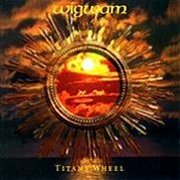 |
Titans Wheel (2002, 68.05) **/T½ |
|
| Remains to Be Seen Subterranean Sunrise Titans Wheel Drive on Driver Bitesize Greatfield Win Your Love Drinks on the House |
Good Mornington Street The Lost Lizard King (Ababacab) To the Other Side Heaven in a Modern World That's the Way (Someone Chanted Evening) |
|
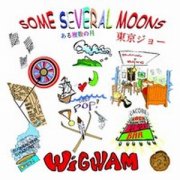 |
Some Several Moons (2005, 60.54) **½/T½ |
|
| (Intro) Chord Squad Sandpainting Bow Lane Kabul Grill Cloudy Dream Deep Pop (Before the Only One Comes) Squaw Valley Non-Event |
Tokyo Joe (One Roll From Paradise) Banging on the Ceiling Cacobe Bar Two-Step |
|
Current availability:
Mellotrons used:
I was warned that these two recent Wigwam albums bore little in common with their excellent '70s work and my informant/supplier (hi, Johannes) wasn't wrong. Wigwam, led by Brit ex-pat Jim Pembroke, were a damn' good band in their day and were one of the few progressive bands from a non-English speaking country to actually achieve some wider recognition. After splitting in the late '70s, they released Light Ages in 1993, then nothing until 2002's Titans Wheel [sic]. I'm afraid there's only one way to describe this album, particularly when you consider how good some of their original albums were: pseudo-commercial dreck. This is a very mainstream record indeed, although it's dated for when it appeared; maybe you can get away with this sort of thing in Finland? It would be generous to describe most of the songs as poor AOR with a blues influence; I certainly can't imagine the international audience taking this to their hearts, to be honest. As if another fault was needed, the album is overlong, with several tracks dragging on for two or three minutes longer than necessary, all assuming you considered them necessary in the first place. The most embarrassing part of an already poor album is Pembroke's jokey ending, where he merely sounds like a man out of time, referencing Sinatra and other singers from the era. Grim.
Finland's Mellotron player to the stars, Esa Kotilainen, adds Mellotron to a handful of tracks here. There's strings and 'Strawberry Fields' flutes on Remains To Be Seen, with more of the same on the title track and a neat descending/ascending string line on closer That's The Way (Someone Chanted Evening), although that's the only good thing about it, plus faint choir/strings/flute on Bitesize. It sounds like it could be Mellotron on one or two other tracks, but the uncredited flutes sound real and the strings don't quite have that strained quality about them (is the quality of Mellotrons not strain'd? Sorry).
The reconstituted band followed up three years on with Some Several Moons, which manages to be better than its predecessor, although I wouldn't take that as any sort of recommendation. The horrible AORisms are largely absent, replaced by a more 'down home' feel on several tracks, which, while rather uninteresting, isn't actually offensive. The mostly-spoken Squaw Valley Non-Event is about the best track, showcasing Pekka Rechardt's guitar work nicely, but this isn't an album to which I can see myself returning very often. OK, ever. Kotilainen gets his Mellotron in again, with more of those 'Strawberry Fields' flutes in the background on Chord Squad and a more straightforward part on Bow Lane, although the album's best Mellotron work is the layered flutes on Squaw Valley Non-Event (also featuring cellos). Background strings on Tokyo Joe (One Roll From Paradise), exceedingly faint flutes on Cloudy Dream and that's yer lot.
See: Esa Kotilainen
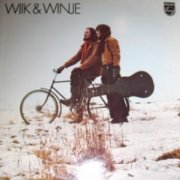 |
Wiik & Winje (1975, 31.55) ***/T |
|
| Legenden om Ola Gran og Skjønne Grete Sangen om Maskinene Lågen (en Ringdans) Hun Danser Sånn er Jeg Skapt Nedi Fjøra Fredssang Blå Vise om Trikken |
Trøst på Avdelingen Lyspæra Klovn Ofotbanen Nedenom og Hjem |
|
Current availability:
Mellotron used:
Neither Terje Wiik nor Jan Winje (especially the latter) are exactly what you'd call well-known, but they teamed up in 1975 to record the one-off Wiik & Winje. It's an album of two halves, featuring rather too many jaunty acoustic numbers of the likes of opener Legenden Om Ola Gran Og Skjønne Grete, the jazzy Sånn Er Jeg Skapt and the slick Fredssang, rescued by the renaissance tonalities of Lågen (En Ringdans) and super-brief closer Nedenom Og Hjem, the former rather endearingly combined with a jazz flute solo, the balladic Hun Danser, the beautiful, flute-led Nedi Fjøra, the Brit-folk-revival soundalike Trøst På Avdelingen and Ofotbanen.
Winje plays Mellotron, with strings on Trøst På Avdelingen and flute and string parts on Klovn, to reasonable effect, although you get the feeling they'd have used a string section if they could've afforded it. Despite only being half-listenable, this is unfairly obscure; another one for a Norske Albumklassikere CD issue? Watch this space.
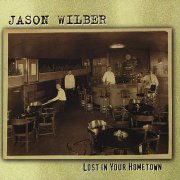 |
Lost in Your Hometown (1998, 41.35) ***½/T½ |
|
| I Fell in Line Walking in the Church Pick Up Your Heart Lost in Your Hometown Evelyn Stars If I Owned a Liquor Store Apologies |
As Far as 25th Street More Alone Than Before [Hidden Track] |
|
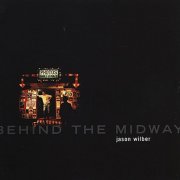 |
Behind the Midway (2000, 41.18) ***/T |
|
| Lay Down When You're Done Indian Summer Goin' Fishin' It's Not Saturday The Great Twenty-Eight Dirty Old Town Over the Road The Galway Waltz |
Your Only One The Ballad of Amazing Grace and Sideshow Dan I Can't See You Anymore |
|
Current availability:
Mellotrons used:
John Prine collaborator Jason Wilber writes the kind of country-inflected songs that transcend that frequently moribund genre, crossed with a downbeat singer-songwriter sensibility, so it's no surprise that there's not one duffer on his solo debut, 1998's Lost in Your Hometown, at its best on the witty If I Owned A Liquor Store and As Far As 25th Street. Wilber plays Mellotron flutes on Stars and wonderfully gratuitous strings on As Far As 25th Street, very clearly genuine.
For those of the non-North American persuasion, the reference in 2000's Behind the Midway is to the area in a funfair or 'carney' where you find the stalls offering anything from sickly candyfloss (cotton candy) to the chance to attempt to knock glued-on coconuts off stands. The album's perfectly good, yet seems to lack Lost in Your Hometown's essential spark, probably at its best on Wilber's cover of Ewan McColl's Dirty Old Town and closer I Can't See You Anymore. Phil Parlapiano plays what I presume to be his M400, with flute and string parts on Over The Road, although the high end of the strings sounds a little inauthentic, frankly.
Wilco (US) see: |
 |
 |
Isles (2013, 40.00) **/T |
|
| Keep You It's Too Late Shine Twisted Backslider Happy Home Another Girl Love Like This |
When It's Over June Take Me Away |
|
Current availability:
Chamberlin used:
Elliot and Natalie Bergman make up the brother/sister duo (yes, another one) Wild Belle, who make mildly skronky, light-as-air pop on their debut, Isles, the title alluding to every track being in a different genre. Well, kind of. In actuality, reggae is a constant touchstone, as is New York electronica, the end result being the kind of album that irritated me more on a second listen than the first, not least due to Natalie's too-sweet-for-its-own-good voice.
Both of the pair play Chamberlin. Really? In an online interview, they say, "...then some things they only made 500 of, like Chamberlin... ...It's a very fragile instrument.", which makes it sound like it's genuine. Credited on five tracks, it's really only audible on three, with strings towards the end of Shine and When It's Over and flutes on Take Me Away, although I have no idea what they might've done with it on the first two tracks. I can't honestly recommend this, real Chamby or no real Chamby. Sorry.
 |
This Can't Be Life (1996, 45.40) **½/½ |
|
| This Misery Spirit Coy Wake Up Sad Charm Want If Blue |
Different Childhood |
|
Current availability:
Chamberlin used:
The Wild Colonials formed after Angela McCluskey moved to California from her native Scotland and teamed up with a group of like-minded musicians. Their schtick is faux-Irish roots-rock, although I don't believe there's a genuine Irishman/woman amongst their number. 1996's This Can't Be Life is their second album, filled with rather ordinary songs with an Irish feel to them, which is either going to make you say, "Hell, yeah!" (or similar) or... it isn't.
Jon Brion plays Chamberlin, although not so's you'd notice. Is that background flute on Coy? If it is, it's the nearest this dullsville album gets to any tape-replay content. I don't think I need to elaborate.
See: Angela McCluskey